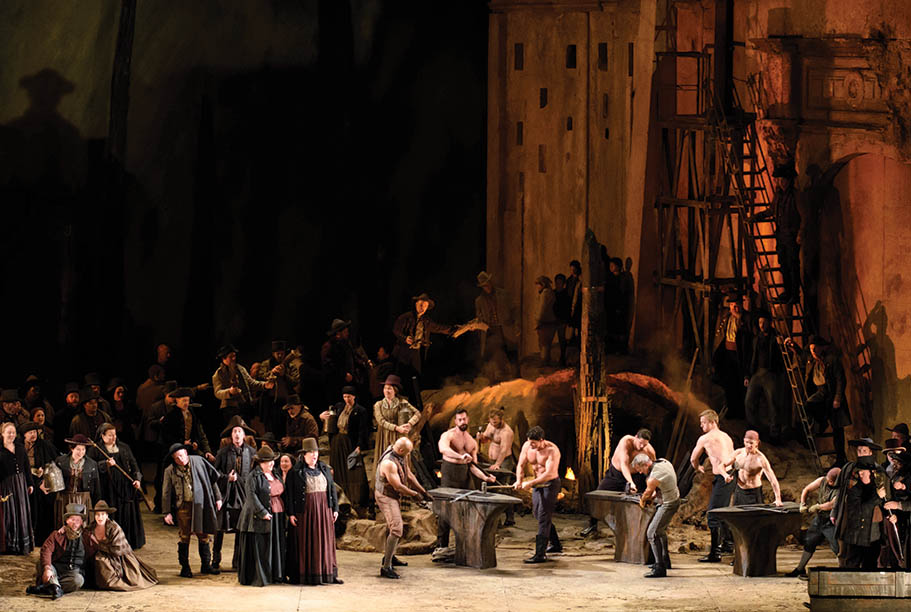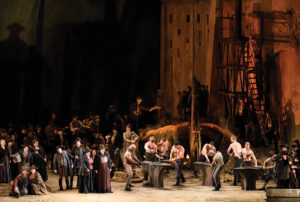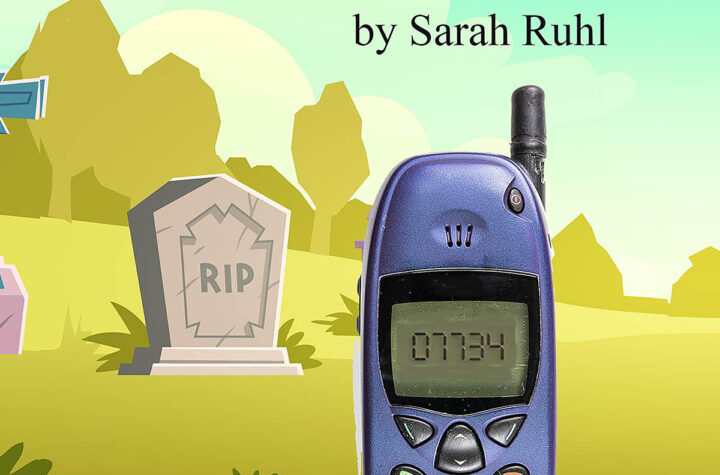
 [rating=4] Giuseppe Verdi’s most dramatic music sure could sell atmosphere. That’s on full diabolical display in the production of Il Trovatore originally directed by Sir David McVicar, now back at the Lyric. With all new leads in the cast and Marco Armiliato conducting, the fast-paced, passionate music matches the Goya Dark Paintings-inspired design to create a world that shows the best of nineteenth century melodrama. The tale of persecution is sinister, it’s exciting, and it’s a bit ridiculous, but the singing actors sell every minute.
[rating=4] Giuseppe Verdi’s most dramatic music sure could sell atmosphere. That’s on full diabolical display in the production of Il Trovatore originally directed by Sir David McVicar, now back at the Lyric. With all new leads in the cast and Marco Armiliato conducting, the fast-paced, passionate music matches the Goya Dark Paintings-inspired design to create a world that shows the best of nineteenth century melodrama. The tale of persecution is sinister, it’s exciting, and it’s a bit ridiculous, but the singing actors sell every minute.
On a slow night of a civil war in fifteenth century Castile, the soldiers of Count di Luna (Artur Ruciński) indulge in some recreational outrage. Their commander, Ferrando (Roberto Tagliavini) narrates the story of how, when the Count was a child, a Roma woman was found casting a spell in his baby brother’s room. The witch was thrown out, but when the child later sickened, she was burnt at the stake. Her daughter kidnapped the baby and its body was found on the same fire that consumed the witch. The count believes his brother is still alive, but he is presently occupied with roughly wooing a lady named Leonora (Tamara Wilson) and with fighting the soldiers led by his rival, the rebel troubadour Manrico (Russell Thomas). The soldiers vow they will have vengeance on the murderer. In the Roma camp, we learn from the witch’s daughter, Azucena (Jamie Barton), that she mistakenly threw her own baby in the fire and raised the count’s real brother, Manrico, as her own. Already hating di Luna, Manrico vows to help her take her revenge.
Verdi’s librettist, Salvadore Cammarano, was dying while writing this, which could account for some of the script’s oddities. It’s often unclear how much time has passed between scenes and game-changing battles happen offstage. This production’s direction isn’t much help with that, although fight choreographer Nick Sandys supplied a few onstage duels and the confusion dovetails with the play’s anxious, dream-like atmosphere. But the characterization is outstanding. Tagliavini’s Ferrando clearly delights in frightening his dull-witted soldiers with the bouncing tune of his real-life ghost story and in working them into an ethnically and gender-tinged righteous fury. Something in the tone of the famous anvil chorus in the camp communicates that the work is hot and exhausting, and that alcohol and sex are actually poor recompense for how the Roma live. When Azucena begins her aria “Stride la vampa,” the story of her mother’s lynching, it is to break up a fight, as if to remind her fellows of who their real enemy is.
Mezzo Jamie Barton’s performances as Azucena holds back nothing. The height of her voice is matched by the anguish on her face and in her body. Although Azucena’s tragic error with the babies is absurd to describe, it’s clear in the performance that she was in the midst of a panic attack at the time and is still traumatized. We see her unravel further by the end. But that doesn’t stop her from joining in with Manrico for one of Verdi’s signature duet declarations of vengeance, which is suitably rousing. Russel Thomas gets his well-deserved first starring role at the Lyric as Manrico, and his tenor is warm and sweet. During his battle cry to save Azucena, “Di quella pira,” his presiding emotion is love, and the one time we hear him performing as the titular troubadour, his voice is mysterious and alluring. But original director Sir McVicar and revival director Roy Rallo have him behave much more harshly toward Leonora, the woman he ostensibly loves, making him considerably less sympathetic.
Debuting at the Lyric, Artur Ruciński strikes a regal pose as the Count di Luna. The baritone’s steady, meditative rendition of “Il balen del suo sorriso,” about his own obsession with Leonora, almost makes di Luna sound dignified. Instead, he is an intimidating villain, who in the final act, becomes truly loathsome. By contrast, the Leonora of Tamar Wilson (another Lyric debut) becomes heroic, and the first person the audience has to really root for in this story. Verdi may have been reluctant to keep the cantabile-cabaletta style for this opera, but it makes Leonora’s longing-turned-giddiness at meeting Manrico strike home. Her aria “D’amor sull’ali rosee” is a rare moment of beauty in the nightmarish world created by designers Charles Edwards, Brigitte Reiffenstuel, Jennifer Tipton, Chris Maravich, and Sara Hatten, and it goes a long way to explain why both brothers are so desperate to seek refuge in her affection. One other thing that must be said in defense of Cammarano and Leone Emanuele Bardare’s libretto is how well they picked the sounds of particular words to match the tense, eerie tone of Verdi’s composition. Each cast member and the conductor take full advantage of the cadence of their language to create pain-filled shadowy figures. It’s a haunting production.
Il Trovatore will continue at the Civic Opera House, 20 N Upper Wacker Drive, Chicago, thru December 9, with the following showtimes:
November 21: 2:00 pm
November 25: 2:00 pm
November 30: 7:00 pm
December 3: 7:00 pm
December 6: 7:00 pm
December 9: 2:00 pm
Running time is two hours and forty minutes with one intermission.
The Lyric offers parking deals with Poetry Garage at 201 W Madison St. if inquired about in advance. Tickets start at $39; to order, visit LyricOpera.org or call 321-827-5600.
To see what others are saying, visit www.theatreinchicago.com, go to Review Round-Up and click at “Il Trovatore.”





More Stories
“Dead Man’s Cell Phone”
“the distrikt of lake michigun”
“Mother Courage and Her Children” reviewed by Jacob Davis